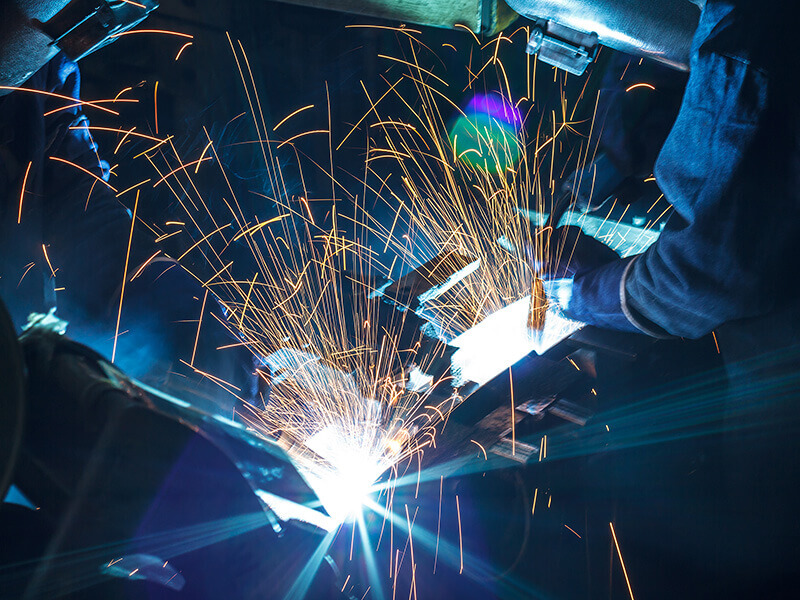March 7, 2019
Design treatment of advanced metals producing better sculpting for defense, vehicles and health products

A Purdue University team created a method for applying a designer surface-active agent to the surface of a metal to make it easier to cut and shape the material into parts and pieces. (Stock photo)
New process targets improvements for manufacturing across several growing industries
WEST LAFAYETTE, Ind. – Most people may not realize it but they encounter products made with exotic or advanced metals every day.
The metals are used in aircraft, orthopedic components, medical instruments, cars, solar panels, military equipment and other applications, and are called advanced or exotic because they are more difficult to find and more costly to use in manufacturing.
 The application of surface-active chemical agents enables the metal cutting to be significantly improved with reduced forces and better surface quality. (Image provided)
Download image
The application of surface-active chemical agents enables the metal cutting to be significantly improved with reduced forces and better surface quality. (Image provided)
Download image
But the conventional method of using advanced metals in manufacturing is high in cost, in part because they tend to be difficult to sculpture. Now, a new process for cutting these metals may help make them easier to use and lead to significant changes in the future of manufacturing. It’s a growing industry – the global metal fabrication market value is expected to reach $24 billion by 2024.
“What we have created is a new way to approach the machining of these metals that has the potential to change manufacturing system processes,” said Srinivasan Chandrasekar, a professor of industrial engineering in Purdue University’s College of Engineering. “Our solution is showing great promise in making these metals more affordable to manufacture and process by making them easier to machine.”
The Purdue team created a method for applying a designer surface-active agent – the name for a variety of chemicals used in metals processing – to the surface of a metal to make it easier to cut and shape the material into parts and pieces. The research is published in the Jan. 10 issue of Physical Review Applied.
Researchers at Purdue used common alcohols on an aluminum surface and were able to cut the metal more easily, with at least 50 percent less force, and produce a smoother end surface with fewer cracks and tears compared with aluminum without the alcohol treatment.
“Purdue provides an extraordinary environment to conduct this kind of research that you will not find at most other universities,” Chandrasekar said. “We have lab equipment and space to test our methods at the scale found in actual manufacturing industry facilities and spaces.”
Chandrasekar said the same approach is showing promise for other metal systems such as stainless steel, tantalum, copper, iron and even nickel alloys. Each metal system requires a specific designer agent since alcohols do not interact with other metals in the same way as they do with aluminum.
Chandrasekar and his team have worked with the Purdue Research Foundation Office of Technology Commercialization on patenting their technologies. They are looking for additional research partners.
Previous research by the same team demonstrated the application of metal marking inks and glues to make gummy metals such as aluminum, stainless steels, copper and tantalum much easier to cut for industrial applications.
Their work aligns with Purdue's Giant Leaps celebration, celebrating the global advancements in sustainability as part of Purdue’s 150th anniversary. This is one of the four themes of the yearlong celebration’s Ideas Festival, designed to showcase Purdue as an intellectual center solving real-world issues.
About Purdue Research Foundation Office of Technology Commercialization
The Office of Technology Commercialization operates one of the most comprehensive technology transfer programs among leading research universities in the U.S. Services provided by this office support the economic development initiatives of Purdue University and benefit the university's academic activities. The office is managed by the Purdue Research Foundation, which received the 2016 Innovation and Economic Prosperity Universities Award for Innovation from the Association of Public and Land-grant Universities. For more information about funding and investment opportunities in startups based on a Purdue innovation, contact the Purdue Foundry at foundry@prf.org. For more information on licensing a Purdue innovation, contact the Office of Technology Commercialization at otcip@prf.org. The Purdue Research Foundation is a private, nonprofit foundation created to advance the mission of Purdue University.
Writer: Chris Adam, 765-588-3341, cladam@prf.org
Source: Srinivasan Chandrasekar, chandy@purdue.edu
Abstract
Altering the Stability of Surface Plastic Flow via Mechanochemical Effects
Anirudh Udupa, Tatsuya Sugihara, Koushik Viswanathan and Srinivasan Chandrasekar
We demonstrate a link between surface plastic flow and the ambient chemical environment — a mechanochemical effect — in large-strain deformation of metals, using high-speed in situ observations. This link, which is different from known mechanochemical effects, is studied using aluminum and an alcohol environment. Three distinct flow modes — sinuous, laminar, and segmented — occur, depending on the action of alcohol on the metal surface. Two transitions, one from sinuous to laminar and the other from sinuous to segmented flow, are demonstrated. In both cases, the final flow modes are characterized by smaller deformation forces (an order of magnitude) as well as a much improved quality of the final surface. The action of the chemical medium itself is coupled to the flow mode, distinguishing it from other mechanochemical effects that have previously been reported. The effect appears to be replicable to different degrees in other metal systems such as copper, iron, stainless steels, and nickel. Based on the observations, a schematic stability phase diagram for plastic flow is proposed. Implications of the results for enhancing the performance of cutting and surface-deformation processes for soft and highly strain-hardening metals are discussed.

